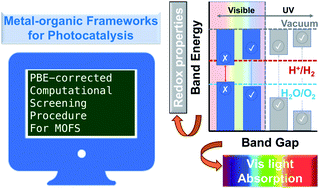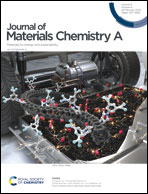Energy-based descriptors for photo-catalytically active metal–organic framework discovery†
Abstract
Metal–organic frameworks (MOFs) consist of metal nodes that are connected by organic linkers. They are thus highly chemically tunable materials given the broad range of potential linkers and nodes that can be chosen for their synthesis. Their tunability has recently sparked interest in the development of new MOF photo-catalysts for energy-related applications such as hydrogen (H2) evolution and CO2 reduction. The sheer number of potentially synthesizable MOFs requires defining descriptors that allow prediction of their performance with this aim. Herein we propose a systematic computational protocol to determine two energy-based descriptors that are directly related to the performance of a MOF as a photocatalyst. These descriptors assess the UV-vis light absorption capability and the band energy alignment with respect to redox processes and/or co-catalyst energy levels. High-throughput screening based on cost-effective computations of these features is envisioned to aid the discovery of new promising photoactive systems.



 Please wait while we load your content...
Please wait while we load your content...